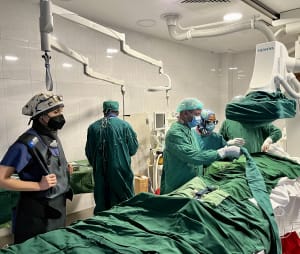Demand for minimally invasive treatments continues to rise around the world. Interventional radiology (IR) in particular is indicated for a broad range of conditions and has numerous advantages over more traditional surgical options, often significantly decreasing associated morbidity and mortality. Examples include image guided thoracentesis, nephrostomy and biliary tube placement, and embolization in the setting of trauma, GI or postpartum hemorrhage. However, many low-income countries have limited or complete lack of IR services. According to the WHO over 4 billion people globally lack access to diagnostic imaging, with likely more than 5 billion lacking access to IR. As of 2017, there was not a single interventional radiologist in Tanzania, leaving a population equivalent to that of California and New York combined without access to a broad range of life-saving treatments. Over the past four years, the “Tanzania Interventional Radiology Initiative” has initiated East Africa’s first IR training program, training the first generation of interventional radiologists in the country. Africa’s first Master of Science in IR curriculum at Muhimbili University in Dar es Salaam was officially announced in October 2019 ( https://medicine.yale.edu/news-article/yales-tanzania-interventional-radiology-initiative-approved-for-msc-program/ ), which gives testament to the rapid progression of the training program. An overview of the program was published in the Journal of Vascular and Interventional Radiology in 2019 ( https://www.jvir.org/article/S1051-0443(19)30687-6/pdf ). In September 2021, the first class of three fellows graduated, which will be followed by graduation of 7 fellows in 2022. The nurse practitioner (NP) has been vital to the growth of the IR services here in America. With NPs performing more image-guided procedures as well as performing high level consults. Nurse practitioners have facilitated the continuity of care by providing pre-and post-procedure care.
While this program most immediately serves the 60 million people living in Tanzania, training IR physicians locally will have regional impact. One of the first IR fellows who recently graduated from the program in Tanzania is from Rwanda, and has returned there as the first IR physician in the country. He has already begun the process of expanding these efforts there and plans to begin training the first generation of Rwandan IR trainees in 2022. One of the prospective 2022 graduates in Tanzania is from Nigeria and will return there are completion of her training
I believe that expanding the many obvious benefits IR already provides to patients in high income nations can be quickly expanded to billions of people around the world in low income nations by training young physicians locally. IR provides a broad range of life-saving procedures and can have an immediate impact, as has been demonstrated in Tanzania over the past several years. I want to support and expand these efforts and contribute to building IR services in Africa, potentially reaching over one billion people who currently have no access to these important treatments










I was part of interventional radiology (IR) team going to Dar es Salaam in Tanzania. The objective was to help train new IR trainees to perform image guided minimally invasive procedures. This is a service that is not readably available in Africa. We worked out of Muhimbili National Hospital, which is a government run institution that caters to those individuals with the greatest health disparities. This was an amazing experience as we performed high level interventions such as transjugular intrahepatic portosystemic shunts, vascular recanalization, liver directed cancer treatments, nephrostomy tube placements and performed numerous biopsies and abscess drainages. We spend a total of 2 weeks teaching the IR trainees on how to perform these high-level interventions. I functioned as a procedure nurse, preparing the patient for their procedure, and remained in the room with them thought the procedure to give fluids or antibiotics and even help manipulate the equipment. I would monitor them post-procedure for any procedure related complications. I also helped evaluate patients in the clinic and helped determine if a procedure was indicated.
It was a humbling experience as the staff resources and necessary supplies were scarce, yet we were able to provide high quality care to patient who would otherwise not have any other alternative aside from possible major surgery. Daily we would perform educational sessions that included reviewing imaging studies and board review questions. The IR fellow were very engaged and really took advantage of our presence there, asking questions and scrubbing into all the cases. I realize that we are training the first generation of IR providers in Africa, and their interventions will bring new hope and a chance for a better life for their people.
I am extremely grateful to have had this opportunity. I am now eager to continue this type of work and look forward to being able to return and be part of the continued growth of this program.